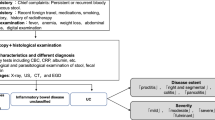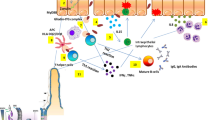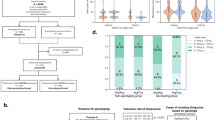Abstract
Background
Extensive investigation of the NF-κB1 -94ins/delATTG promoter polymorphism for risk association with ulcerative colitis (UC) and Crohn’s disease (CD) risk has yielded conflicting results.
Aims
The objective of this meta-analysis was to evaluate the risk association between the NF-κB1 -94ins/delATTG promoter polymorphism and UC and CD.
Methods
All eligible case–control studies of the association of NF-κB1 -94ins/delATTG promoter polymorphism with UC and CD were identified in the Pubmed and Embase databases. From these data, odds ratios (OR) with 95 % confidence intervals (CI) were calculated. Meta-analysis was performed for alleles (D vs. W) and genotypes (DD + WD vs. WW, DD vs. WW + WD, DD vs. WW, WD vs. WW) in a fixed/random effects model.
Results
Nine case–control studies that included 4,447 cases (2,631 UC and 1,816 CD) and 2,195 controls were identified. Results indicated increased risk association of D allele carriers with UC (D vs. W: OR = 1.08, 95 % CI = 1.01–1.17, P = 0.03; DD vs. WW + WD: OR = 1.16, 95 % CI = 1.01–1.32, P = 0.04 and DD vs. WW: OR = 1.20, 95 % CI = 1.03–1.39, P = 0.02). No risk association was identified with CD.
Conclusion
This meta-analysis indicated that the NF-κB1 -94ins/delATTG promoter polymorphism is a risk factor for UC but not CD.


Similar content being viewed by others
References
Bonen DK, Cho JH. The genetics of inflammatory bowel disease. Gastroenterology. 2003;124:524–536.
De Vry CG, Prasad S, Komuves L, et al. Non-viral delivery of nuclear factor-kappaB decoy ameliorates murine inflammatory bowel disease and restores tissue homeostasis. Gut. 2007;56:524–533.
Takedatsu H, Taylor KD, Mei L, et al. Linkage of Crohn’s disease-related serological phenotypes: NF-κB1 haplotypes are associated with anti-CBir1 and ASCA, and show reduced NF-kappaB activation. Gut. 2009;58:60–67.
Le Beau MM, Ito C, Cogswell P, Espinosa R 3rd, Fernald AA, Baldwin AS Jr. Chromosomal localization of the genes encoding the p50/p105 subunits of NF-kappa B (NF-κB2) and the I kappa B/MAD-3 (NF-κBI) inhibitor of NF-kappa B to 4q24 and 14q13, respectively. Genomics. 1992;14:529–531.
Mathew S, Murty VV, Dalla-Favera R, Chaganti RS. Chromosomal localization of genes encoding the transcription factors, c-rel, NF-kappa Bp50, NF-kappa Bp65, and lyt-10 by fluorescence in situ hybridization. Oncogene. 1993;8:191–193.
Beinke S, Ley SC. Functions of NF-kappaB1 and NF-kappaB2 in immune cell biology. Biochem J. 2004;382:393–409.
Karban AS, Okazaki T, Panhuysen CI, et al. Functional annotation of a novel NF-κB1 promoter polymorphism that increases risk for ulcerative colitis. Hum Mol Genet. 2004;13:35–45.
Borm ME, van Bodegraven AA, Mulder CJ, Kraal G, Bouma G. A NF-κB1 promoter polymorphism is involved in susceptibility to ulcerative colitis. Int J Immunogenet. 2005;32:401–405.
Oliver J, Gómez-García M, Paco L, et al. A functional polymorphism of the NF-κB1 promoter is not associated with ulcerative colitis in a Spanish population. Inflamm Bowel Dis. 2005;11:576–579.
Mirza MM, Fisher SA, Onnie C, et al. No association of the NF-κB1 promoter polymorphism with ulcerative colitis in a British case control cohort. Gut. 2005;54:1205–1206.
Glas J, Török HP, Tonenchi L, et al. Role of the NF-κB1-94ins/delATTG promoter polymorphism in IBD and potential interactions with polymorphisms in the CARD15/NOD2, IKBL, and IL-1RN genes. Inflamm Bowel Dis. 2006;12:606–611.
Latiano A, Palmieri O, Valvano MR, et al. Evaluating the role of the genetic variations of PTPN22, NF-κB1, and FcGRIIIA genes in inflammatory bowel disease: a meta-analysis. Inflamm Bowel Dis. 2007;13:1212–1219.
Szamosi T, Lakatos PL, Hungarian IBD Study Group, et al. The 3′UTR NF-κBIA variant is associated with extensive colitis in Hungarian IBD patients. Dig Dis Sci. 2009;54:351–359.
Lei Y, Deng C-S. Association of NF-κB1 -94ins/delATTG promoter polymorphism with ulcerative colitis in Chinese Han population of Hubei Province. World Chin J Digestol. 2009;17:2212–2216.
Andersen V, Christensen J, Ernst A, et al. Polymorphisms in NF-κB, PXR, LXR, PPARγ and risk of inflammatory bowel disease. World J Gastroenterol. 2011;17:197–206.
Zou YF, Wang F, Feng XL, et al. Association of NF-κB1 -94ins/delATTG promoter polymorphism with susceptibility to autoimmune and inflammatory diseases: a meta-analysis. Tissue Antigens. 2011;77:9–17.
Zou YF, Yuan FL, Feng XL, et al. Association between NF-κB1 -94ins/delATTG promoter polymorphism and cancer risk: a meta-analysis. Cancer Invest. 2011;29:78–85.
Andersen V, Christensen J, Østergaard M et al. Association of the nuclear receptors PXR, LXR and PPARγ with ulcerative colitis in the Danish population: a case-control study. Inflamm Bowel Dis. 2009;15:S29.
Borm ME, He J, Kelsall B, Peña AS, Strober W, Bouma G. A major quantitative trait locus on mouse chromosome 3 is involved in disease susceptibility in different colitis models. Gastroenterology. 2005;128:74–85.
Farmer MA, Sundberg JP, Bristol IJ, et al. A major quantitative trait locus on chromosome 3 controls colitis severity in IL-10-deficient mice. Proc Natl Acad Sci USA. 2001;98:13820–13825.
Chang M, Lee AJ, Fitzpatrick L, Zhang M, Sun SC. NF-kappaB1 p105 regulates T cell homeostasis and prevents chronic inflammation. J Immunol. 2009;182:3131–3138.
Tomczak MF, Erdman SE, Poutahidis T, et al. NF-kappa B is required within the innate immune system to inhibit microflora-induced colitis and expression of IL-12 p40. J Immunol. 2003;171:1484–1492.
Hampe J, Schreiber S, Shaw SH, et al. A genomewide analysis provides evidence for novel linkages in inflammatory bowel disease in a large European cohort. Am J Hum Genet. 1999;64:808–816.
Cho JH, Nicolae DL, Gold LH, et al. Identification of novel susceptibility loci for inflammatory bowel disease on chromosomes 1p, 3q, and 4q: evidence for epistasis between 1p and IBD1. Proc Natl Acad Sci USA. 1998;95:7502–7507.
Atreya I, Atreya R, Neurath MF. NF-kappaB in inflammatory bowel disease. J Intern Med. 2008;263:591–596.
Ishikawa H, Claudio E, Dambach D, Raventós-Suárez C, Ryan C, Bravo R. Chronic inflammation and susceptibility to bacterial infections in mice lacking the polypeptide (p)105 precursor (NF-κB1) but expressing p50. J Exp Med. 1998;187:985–996.
Erdman S, Fox JG, Dangler CA, Feldman D, Horwitz BH. Typhlocolitis in NF-kappa B-deficient mice. J Immunol. 2001;166:1443–1447.
Baer M, Dillner A, Schwartz RC, Sedon C, Nedospasov S, Johnson PF. Tumor necrosis factor alpha transcription in macrophages is attenuated by an autocrine factor that preferentially induces NF-kappaB p50. Mol Cell Biol. 1998;18:5678–5689.
Visekruna A, Joeris T, Seidel D, et al. Proteasome-mediated degradation of IkappaBalpha and processing of p105 in Crohn disease and ulcerative colitis. J Clin Invest. 2006;116:3195–3203.
Driessler F, Venstrom K, Sabat R, Asadullah K, Schottelius AJ. Molecular mechanisms of interleukin-10-mediated inhibition of NF-kappaB activity: a role for p50. Clin Exp Immunol. 2004;135:64–73.
Tomczak MF, Erdman SE, Davidson A, et al. Inhibition of Helicobacter hepaticus-induced colitis by IL-10 requires the p50/p105 subunit of NF-kappa B. J Immunol. 2006;177:7332–7339.
Conflict of interest
None.
Author information
Authors and Affiliations
Corresponding author
Rights and permissions
About this article
Cite this article
Liang, M., Xu, X., Gong, Y. et al. Risk Association Between the NF-κB1 -94ins/delATTG Promoter Polymorphism and Inflammatory Bowel Diseases: A Meta-Analysis. Dig Dis Sci 57, 2304–2309 (2012). https://doi.org/10.1007/s10620-012-2164-x
Received:
Accepted:
Published:
Issue Date:
DOI: https://doi.org/10.1007/s10620-012-2164-x




